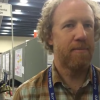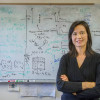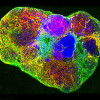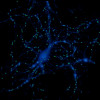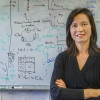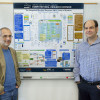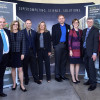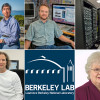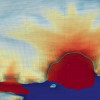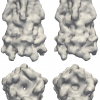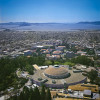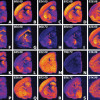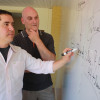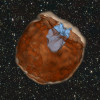News Center
CRD's Dáithí Stone Comments on Recent Paris Climate Agreement
Carbon Brief spoke to a number of prominent scientists - including Dáithí Stone of the Computational Research Division - at the American Geophysical Union meeting in San Francisco to get their thoughts on the new Paris climate agreement. Read More »
Xiaoye "Sherry" Li Elected to SIAM Council
Sherry Li, a member of CRD’s Scalable Solvers Group, has been elected to the Society for Industrial and Applied Mathematics (SIAM) Council where she will help shall formulate the scientific policies of SIAM, monitor its technical activities, propose new activities,and recommend action to the Board as appropriate. Read More »
OpenMSI Wins R&D100 Award
OpenMSI, the most advanced web-available tool for analyzing and visualizing mass spectrometry instruments (MSI) data was one of seven Berkeley Lab winners of R&D100 awards announced last week. Oliver Rübel of CRD and Ben Bowen of the Environmental Genomics and Systems Biology Division led the development of OpenMSI with collaboration from NERSC. Read More »
CRD Research Team Optimizing Spark Data Analytics Framework for HPC
A team of scientists from Berkeley Lab’s Computational Research Division (CRD) has been awarded a two-year, $110,000 grant by Intel to support their goal of enabling data analytics software stacks—notably Spark—to scale out on next-generation high performance computing (HPC) systems. Read More »
‘Sidecars’ Pave the Way for Concurrent Analytics of Large-Scale Simulations
A new software tool developed through a multi-disciplinary collaboration at Berkeley Lab allows researchers running large-scale simulations at NERSC and other supercomputing facilities to do data analytics and visualizations while the simulations are running. Read More »
Lab Staff to Ply Expertise at SIAM Conference on Applied Linear Algebra
Xiaoye Sherry Li will give an invited talk at the 2015 SIAM Conference on Applied Linear Algebra. She and 10 other Computing Sciences staff contributed papers and posters to the conference program. Read More »
Is Your Digital Information More at Risk Today Than 10 Years Ago?
Researchers from the University of New Mexico and Berkeley Lab say cybersecurity breeches are not happening more frequently than they did a decade ago. And these data breaches in general are not growing in size. Read More »
New Berkeley Lab Partnership Offers Computing Science Research Opportunities to Faculty, Students from Diverse Backgrounds
A new program being launched by Berkeley Lab's Computing Sciences organization to provide research opportunities for faculty and students from diverse backgrounds will begin with an introductory Dec. 7-8 workshop. Read More »
CRD’s Costin Iancu to Present at NITRD Workshop on Software Sustainability
Costin Iancu of CRD’s Computer Languages and Systems Software (CLaSS) Group will give a short talk and present a poster at the Oct. 15-16 workshop on Computational Science & Engineering Software Sustainability and Productivity Challenges. An inter-agency workshop sponsored by the Networking and Information Technology Research and Development (NITRD), CSESSP Challenges will identify the unique issues around software productivity and sustainability faced by the NITRD computational science… Read More »
After 10 Years, IMG Still Revolutionizing Genomics
This year, the Integrated Microbial Genome (IMG) data management system celebrates its tenth anniversary. In honor of this milestone, the Berkeley Lab researchers who led the development of IMG—Victor M Markowitz and Nikos C Kyrpides—reflect on its development, evolution and impact. Read More »
New DOE Office of Science Support for CAMERA to Develop Computational Mathematics for Experimental Facilities Research
The Department of Energy has announced approval of a joint ASCR-BES-supported award of $10.5 million over three years to expand the Center for Advanced Mathematics for Energy Research Applications (CAMERA). Read More »
Berkeley Lab Joins DOE’s New HPC4Manufacturing Program
Berkeley Lab is collaborating with Lawrence Livermore and Oak Ridge national laboratories to lead a new Department of Energy program designed to fund and foster public-private R&D projects that enhance U.S. competitiveness in clean energy manufacturing. Read More »
CRD Researchers Honored with Director’s Awards for Exceptional Achievement
Five employees in the Computing Sciences organization staff, including CRD's Deborah Agarwal and James Sethian, are recipients of this year’s Director’s Award for Exceptional Achievement. Read More »
Ice Sheet Model Reveals Most Comprehensive Projections for West Antarctica’s Future
A new international study is the first to use a high-resolution, large-scale computer model to estimate how much ice the West Antarctic Ice Sheet could lose over the next couple of centuries, and how much that could add to sea-level rise. Read More »
CRD’s Oliker New Lead for DOE’s SUPER Project to Improve HPC Performance, Efficiency
Leonid “Lenny” OIiker of the Computational Research Division has stepped in as the leader of the Institute for Sustained Performance, Energy, and Resilience, or SUPER, an HPC performance project that's part of DOE's SciDAC Program. Read More »
CRD’s Buluç Receives 2015 IEEE TCSC Award for Excellence for Early Career Researchers
Aydin Buluç of the Computational Research Division has been named a recipient of the 2015 IEEE TCSC Award for Excellence for Early Career Researchers. Buluç is one of three recipients of this year’s award, which will be presented at the SC15 conference in November. Read More »
New Mathematics Advances the Frontier of Macromolecular Imaging
Berkeley Lab researchers have introduced new mathematical theory and an algorithm, which they call "Multi-tiered iterative phasing (M-TIP)," to solve the reconstruction problem from fluctuation X-ray scattering data. This approach is an important step in unlocking the door to new advances in biophysics and has the promise of ushering in new tools to help solve some of the most challenging problems in the life sciences. Read More »
CRD Hosts a Record Six CSGF Fellows
This year, Berkeley Lab’s CRD is hosting six fellows from the Department of Energy’s CSGF program.These fellows represent some of the nation’s brightest graduate students in computational science. Each student is pursing a doctoral degree in a field that uses supercomputing to solve complex science and engineering problems. Read More »
‘Data Deluge’ Pushes Mass Spectrometry Imaging to New Heights
Berkeley Lab researchers are combining mathematical theory and scalable algorithms with computational resources at NERSC to address growing data-management challenges in climate research, high-energy physics and the life sciences. Read More »
Project Jupyter gets $6M to expand collaborative data science software
Three foundations pledged $6M over the next three years to Project Jupyter, an open-source software project that supports scientific computing and data science across a wide range of programming languages via a large, public, open and inclusive community. Fernando Perez will lead the effort at UC Berkeley and Berkeley Lab. Read More »
David Donofrio to Lead Computer Architecture Group
David Donofrio—a veteran Computer Systems Engineer at Berkeley Lab—has been selected to lead the new Computer Architecture Group in the Computational Research Division (CRD). Read More »
First NESAP Post-doc Takes on BoxLib
Brian Friesen, the first of eight post-doctoral researchers participating in the NERSC Exascale Science Applications Program, is now working full time at NERSC. His mission is to work with CRD's CCSE to improve the effiiciency of BoxLib codes for new supercomputer architectures. Read More »
CCSE’s Juliane Mueller Optimizes Codes to Cut Computational Costs
Finding a way to keep computing expenses down while still getting the most science from the simulations is the specialty of Juliane Mueller, the 2014 Alvarez Fellow in Berkeley Lab's Computational Research Division. She’s a member of the Center for Computational Sciences and Engineering, which develops algorithms to study complex problems ranging from combustion to supernovae.
Read More »
Meraculous: Deciphering the ‘Book of Life’ With Supercomputers
A team of scientists from Berkeley Lab, JGI and UC Berkeley, simplified and sped up genome assembly, reducing a months-long process to mere minutes. This was primarily achieved by “parallelizing” the code to harness the processing power of supercomputers. Read More »
Hunting Supernova with Supercomputers
Using a “roadmap” of theoretical calculations and supercomputer simulations performed at NERSC by Berkeley Lab’s Daniel Kasen, astronomers observed for the first time a flash of light caused by a supernova slamming into a nearby star, allowing them to determine the stellar system from which the supernova was born. This finding confirms one of two competing theories about the birth of Type Ia supernovae. Read More »









